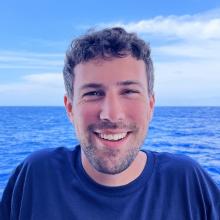
Kyle Aaron
Tell us about your work/research. What kinds of things do you do?
I help develop, maintain, and operate oceanographic research instruments such as autonomous profilers, gilders, and various types of sensors as well as assist with the management of data and samples after expeditions. I also play an active role in experimental design, informing how to best utilize the tools we have to answer scientific questions and explore the ocean. Every day is different - some days I might be designing a part for an instrument, others I might be testing a glider or coordinating with scientists about a particular project, and some days I am out at sea deploying oceanographic equipment for research! Many scientists do the important job of analyzing data and writing research papers, which happens after the data is gathered, but I work primarily on the side of oceanographic research dealing with how to gather the data we want.
What sparked your initial interest in your career?
I grew up really loving science, technology, and marine creatures. I loved visiting and learning about the ocean on trips with my family to Hawai'i or the Georgia Aquarium. The ocean was always something I wanted to spend more time exploring, even as I got older. I would tell people I wanted to be a marine biologist, but it wasn't until I talked to someone in the field that I understood what the career entailed. I decided to pursue a broad STEM background in undergraduate school, and I studied marine science for my masters. It was through my varied courses that I learned how an interdisciplinary understanding of science can be so beneficial in oceanographic research. Once I got to graduate school I was able to apply what I had learned so far in my education to the field I loved - Oceanography.
Who influenced you or encouraged you the most?
My parents always encouraged me to pursue a career in marine science, even though they didn't fully know what it meant. Nevertheless, they helped spark my initial interest in oceanography by taking me to cool places as a kid, and they inspired & supported me along the way. When it came to educational influence, I had countless teachers in high school who encouraged me to pursue oceanography, and my professors throughout college & graduate school helped hone my interests and skills.
What element of your work/study do you think is the most fascinating?
I love getting to apply engineering problem solving skills to ocean exploration and ecological research, and I love getting to see images or samples collected by instruments I have worked with. When I was in graduate school, I worked with a towed zooplankton imaging system, and my favorite part was seeing images of large, interesting zooplantkon such as mantis shrimp or larval fish. I also really enjoy getting to deploy the equipment I am working on at sea, especially when it is a place that has never been explored with an instrument like it.
How did you get involved with the Ocean Exploration Trust?
One of the research labs I work with at URI developed and operates the Deep Autonomous Profiler, which is being deployed as part of the multi-vehicle exploration for OET. Part of my job is deploying oceanographic equipment at sea, and I was involved in adding some updates to the instrument, so I was a natural choice for helping deploy it.
What other jobs led you to your current career?
Before my current role, I was a graduate student at the University of Georgia's Skidaway Institute of Oceanography where I studied zooplankton ecology using a towed imaging system. I gained a lot of experience applying my undergraduate education to the realm of marine science by analyzing scientific data, writing research papers, and getting experience at sea aboard research cruises.
What are your degrees and certifications?
Bachelors of Science in Physics - University of North Georgia 2019
Bachelors of Biological Engineering, Minor in Ecology - University of Georgia 2019
Master of Science in Marine Science - University of Georgia 2022
Graduate Certificate in Oceanographic Engineering - University of Georgia 2022
What are your hobbies?
I love sailing - one of the perks of living in Rhode Island is there is no shortage of that. I also really enjoy hiking and camping. I like watching movies and having game nights with friends. I am also really involved in my church!
What advice would you give someone who wants to have a career like yours?
If you are interested in oceanography, I would suggest developing a broad background understanding of science and how it applies to the ocean. It would also be valuable to learn skills that are commonly used to study marine science, such as computer and programming skills, data analysis using diferent software, and seamanship/boating. Reach out to people who do research you might be interested in, and ask if you can talk to them about what skills are useful to develop in their area of expertise. Be patient and don't be afraid to ask questions and reach out to people for guidance.
Expeditions
Kyle participated in the following Ocean Exploration Trust expeditions:
